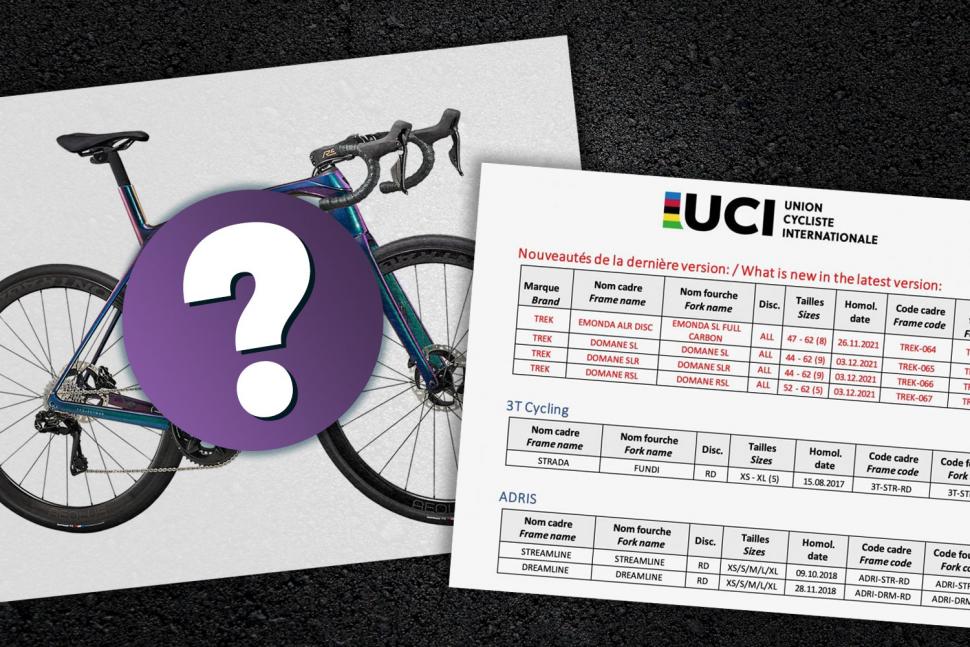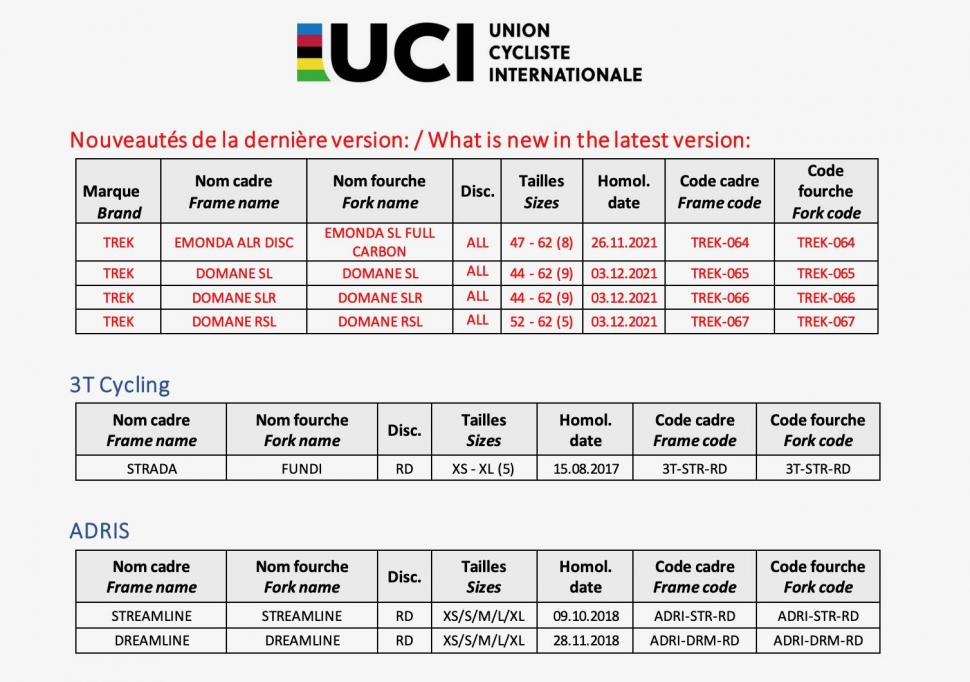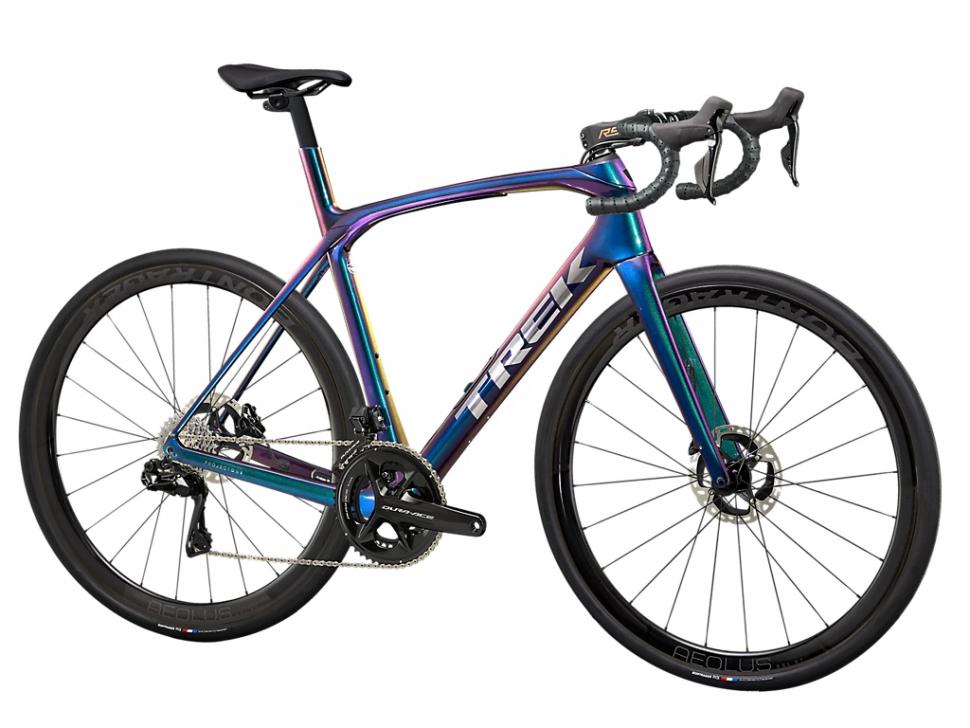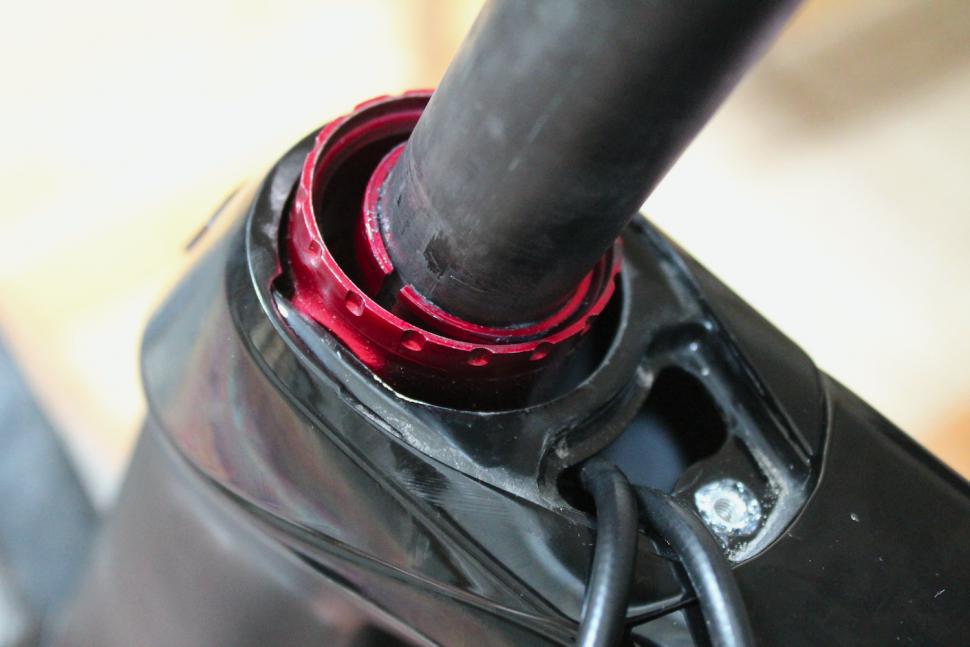- News
- Reviews
- Bikes
- Components
- Bar tape & grips
- Bottom brackets
- Brake & gear cables
- Brake & STI levers
- Brake pads & spares
- Brakes
- Cassettes & freewheels
- Chains
- Chainsets & chainrings
- Derailleurs - front
- Derailleurs - rear
- Forks
- Gear levers & shifters
- Groupsets
- Handlebars & extensions
- Headsets
- Hubs
- Inner tubes
- Pedals
- Quick releases & skewers
- Saddles
- Seatposts
- Stems
- Wheels
- Tyres
- Tubeless valves
- Accessories
- Accessories - misc
- Computer mounts
- Bags
- Bar ends
- Bike bags & cases
- Bottle cages
- Bottles
- Cameras
- Car racks
- Child seats
- Computers
- Glasses
- GPS units
- Helmets
- Lights - front
- Lights - rear
- Lights - sets
- Locks
- Mirrors
- Mudguards
- Racks
- Pumps & CO2 inflators
- Puncture kits
- Reflectives
- Smart watches
- Stands and racks
- Trailers
- Clothing
- Health, fitness and nutrition
- Tools and workshop
- Miscellaneous
- Buyers Guides
- Features
- Forum
- Recommends
- Podcast
TECH NEWS
 New Trek Domane March 2022
New Trek Domane March 2022Trek to launch new Domane range
Trek is set to launch a new (2023 model year) Domane endurance road bike range, with updated Domane SL, Domane SLR, and Domane RSL models added to the UCI’s List of Approved Models of Framesets today. The timing of the update suggests that we could see the top-level version of the brand's most popular road bike being raced by the Trek-Segafredo team in this spring’s cobbled classics.
> Is a new Specialized Allez Sprint on the way in 2022?
The UCI’s list tells us little other than that the new bikes exist and that they can be raced. As with the rest of Trek’s range, the SLR version will be a higher spec than the SL, probably using a different grade of carbon fibre. In the current range, the Domane SLR uses Trek’s 700 Series OCLV Carbon, for example, while the Domane SL is made from 500 Series OCLV Carbon.
There’s no guarantee that Trek will stick with those carbon-fibre grades with this update. When it launched the most recent version of the Émonda SLR, Trek introduced OCLV 800 Series carbon fibre which it says is 30% stronger than the material it uses for OCLV 700 – meaning that less can be used to keep the weight down. That said, a super-light weight is one of the Émonda’s key characteristics whereas it’s a less important consideration for a bike like the Domane, so who knows?
All-new Émonda gets aero to become "Trek’s fastest climbing bike ever" – and it's disc brake-only
The Emonda SL is still made from 500 Series OCLV Carbon and we’d expect the Domane SL to stick with the same material too.
As for the RSL model, that’s likely to denote a different geometry. Trek Domane RSLs have in the past been team edition bikes and there’s currently an Émonda SLR RSL H1 frameset in the range with a lower and longer geometry than the standard version, for a more aggressive ride position.
When Trek last updated the Domane range – in 2019 – it made the platform more aerodynamically efficient, added clearance for tyres up to 38mm wide, and introduced hidden storage in the down tube.
The big new feature, though, was the addition of adjustable top tube IsoSpeed on the SLR models (an IsoSpeed decoupler between the top tube and the seat tube that adds flex at the saddle has been a feature since 2012).
Essentially, this means that the seat tube, seatpost and saddle can move relative to the rest of the frame to absorb road vibration, the adjustment sitting under the top tube.
Read our review of the current Trek Domane SL Disc frameset
Both the Domane SL and Domane SLR also feature front Isospeed which performs a similar function at the handlebar. The upper headset bearing sits in a rocker cup that allows the fork steerer to flex.
This is the current Trek Domane SLR9 Dura-Ace
Trek could change the IsoSpeed design(s) again for the new Domane range but it’s getting to the point where adding more compliance would fundamentally alter the character of the bike. You can’t keep going along that route forever.
We can see that trickling the Domane SLR's adjustable top tube IsoSpeed tech down to Domane SL level might make sense, as long as Trek has something new for the Domane SLR to differentiate the two levels. What could that be? You can’t currently adjust front IsoSpeed whereas you can tune Specialized’s Future Shock 2.0 to the rider and conditions. It’s a complete guess but maybe that’s where Trek is heading next.
Here's the front IsoSpeed system currently used by Trek
Aside from that, we’re down to the usual possibilities: lighter, stiffer, more aero. Those are the usual characteristics that get shouted about whenever there’s a new road bike in town.
What features would you like to see in the new Trek Domane range?
Mat has been in cycling media since 1996, on titles including BikeRadar, Total Bike, Total Mountain Bike, What Mountain Bike and Mountain Biking UK, and he has been editor of 220 Triathlon and Cycling Plus. Mat has been road.cc technical editor for over a decade, testing bikes, fettling the latest kit, and trying out the most up-to-the-minute clothing. He has won his category in Ironman UK 70.3 and finished on the podium in both marathons he has run. Mat is a Cambridge graduate who did a post-grad in magazine journalism, and he is a winner of the Cycling Media Award for Specialist Online Writer. Now over 50, he's riding road and gravel bikes most days for fun and fitness rather than training for competitions.
Latest Comments
- eburtthebike 6 hours 34 min ago
The deterrent effect is almost certainly due to the massively increased likelihood of the offence being detected. As with other crimes, if the...
- Martin1857 7 hours 1 min ago
As a member of the Co-op community (I live in a Housing Co-op) and a bike owner /rider, this is very sad news. We need more Co-ops not less.
- AnotherChrisOnAnotherTrike 7 hours 2 min ago
My EV exceeds the size. It's the smallest vehicle available which can transport my wife's trike (excursions or rescue).
- Dnnnnnn 6 hours 52 min ago
It is sad for the individuals concerned but (and this is a general point, rather than specific to this story), we're much better off overall for...
- No Reply 7 hours 43 min ago
I agree with Pogacar regarding social media. The likes of Facebook, Instagram have done untold damage, especially to the minds of young people....
- David9694 7 hours 48 min ago
Lorry carrying 25 tonnes of beer catches fire on the M11...
- No Reply 7 hours 52 min ago
If you're a cyclist on a road you are public enemy number 1.
- Rendel Harris 8 hours 21 min ago
He advocates only riding mountainbikes solely offroad for ultimate safety, which is great if you're a millionaire of leisure living in Colorado...
- ktache 8 hours 53 min ago
That looks like a fun bike. Frame only, 2 and an 1/2 grand.
- wtjs 9 hours 49 min ago
Fair enough, personal experience may trump (not that one) theory. However, the bonking I have experienced has been due to lack of carbs. Your point...



Add new comment
6 comments
Which features? Third bottle cage mounts and bento box mounts would be my vote. Endurance means riding for longer therefore need more food and water. The Aluminium models have these features so why not the more expensive models?
Everyone ignoring the top line on that chart, with the new Emonda ALR? Personally more excited about that as a more affordable and lighter all around road platform without a seatmast or as many proprietary parts.
Totally agree, especially as you couldn't buy an ALR frameset for love nor money last year - at least in large. And I did try very hard.
Lighter would be a big change - the current Domane is cycling's equivalent of a tank weight-wise.
There seems to be some mistaken statements regarding the current Domane SLR vs SL. There is no "top-tube" IsoSpeed on the SLR. What is in place underneath the top tube on the SLR is the adjustment for the rear Isospeed.The SL level has the same system in place without the adjustability. So there is no "top-tube" IsoSpeed to trickle down to SL models. Adjustable Rear IsoSpeed is the feature and what could potentially be added to the SL models, if Trek decides to eliminate this as a key differentiation points between the models other than the grade of carbon used.
Hi John
Top Tube IsoSpeed is Trek's term referring to the system on Domane SLR where the seat tube is split in two, the lower section fixed while the upper section is able to move. The upper section features a forward extension that connects underneath the top tube, where it is adjustable.
The system on the SL, a carryover from the previous generation Domane, is a different design that relies on the entire seat tube flexing. There’s no forward extension/top tube element here.